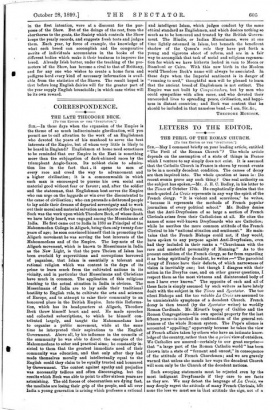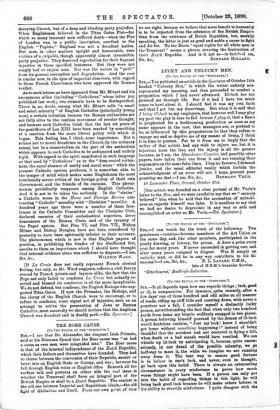LETTERS TO THE EDITOR.
THE PERIL OF THE ROMAN CHURCH.
[TO THE EDITOR OF THE "SPECTATOR.']
SIR,—May I comment briefly on your leading article, entitled "The Peril of the Roman Church"? The whole article depends on the assumption of a state of things in France which I venture to say simply does not exist. It is assumed that the Catholic Church in France is shown by recent events to be in a morally decadent condition. The causes of decay are then inquired into. The whole question at issue is : Do recent events prove any such thing ? One real authority on the subject has spoken,—Mr. J. E. C. Bodley, in his letter to the Times of October 17th. He emphatically denies that the much-quoted La Croix represents in any way the spirit of the French clergy. "It is violent and scurrilous," he writes, "because it represents the methods of French popular journalism of every political school." Mr. Bodley denies that the Anti-Dreyfusism of so large a section of French Clericals arises from their Catholicism at all. He cites the names of some well-known Dreyfusards who are Catholics ; while he ascribes the more common attitude of the French Clerical to his "national situation and sentiment." He main- tains that the French Bishops could not, if they would, have spoken to any purpose againt Anti-Dreyfusism, even had they included in their ranks a "Churchman with the rare and masterful personality of Manning." As to the present condition of the French clergy, so far from regarding it as being spiritually decadent, he writes :—" The parochial clergy of France have their defects, of which narrowness of vision is inevitably one ; but though I disagree with their action in the Dreyfus case, and on other graver questions, I respect them as the most virtuous and disinterested body of men I have ever known." The opposite of each and all of these facts is simply assumed by such writers as have lately dealt with the subject in the Times and Spectator. The too silent Bishops and the too voluble La Croix are assumed to be unmistakable symptoms of a decadent Church. French decay is then traced (by the Spectator writer) to worldly Roman Cardinals. Mr. Mivart's bogey of Galileo and the Roman Congregations—his own special property for the last fifteen years—is invoked in confirmation of the general rot- tenness of the whole Roman system. The Pope's silence is accounted "appalling," apparently because he takes the view of French affairs taken by others who have an intimate know- ledge of the country, rather than the a priori view of outsiders. We Catholics are assured—certainly to our great surprise— that "a large part of the Roman Catholic world" has been thrown into a state of "ferment and unrest," in consequence of the attitude of French Churchmen ; and we are gravely warned that unless she mends her ways the decadent Church will soon only be the Church of the decadent nations.
Such sweeping statements must be rejected even by the most indignant Dreyfusards if they care to see facts as they are. We may detest the language of La Croix, we may deeply regret the attitude of many French Clericals, hilt none the less we must see in that attitude the sign, not of a
decaying Church, but of a deep and blinding party prejudice. When Englishmen believed in the Titus Oates Plot—for which so many innocent men suffered death—when the Fire of London was, in a public inscription, ascribed to the English "Papists," England was not a decadent nation.
But men, in other matters upright and honourable, were victims of a cnlpable, though apparently almost irresistible, party prejudice. They deserved reprobation for their flagrant injustice in these specified instances. But they were not simply bad or unjust wen. Nor was the nation in " peril " from its general corruption and degradation. And the case is similar now, in the eyes of impartial observers, with regard to those French Churchmen who have approved the Rennes verdict.
As to such letters as have appeared from Mr. Mivart and his anonymous allies (including " Catholicus," whose letter you published last week), two elements have to be distinguished. There is, no doubt, among what Mr. Mivart calls "a small and select minority" of English Catholics (principally young men), a certain irritation because the Roman ant horities are not fully alive to the restless movement of secular thought, and because such Catholics think that the last six years of the pontificate of Leo XIII. have been marked by something of a reaction from the more liberal policy with which it began. This feeling has, I think, some importance. But it relates not to moral decadence in the Church (in the ordinary sense), but to a conservatism on the part of the authorities which appears to such Catholics to be antiquated and unduly rigid. With regard to the spirit manifested in such language as that used by " Catholicus " as to the "deep-seated rotten- ness, the equal absence of sanity and moral sense" which the present Catholic system produces, it is somewhat akin to the temper of mind which makes some Englishmen the most irrationally severe critics of the foreign policy of their own Government, and the friends of its enemies. This pheno- menon periodically reappears among English Catholics. And it is not to be taken too seriously. In the " sixties " a Catholic wrote in the Home and Foreign Review con- trasting "Catholic" morality with " Christian" morality. A hundred years ago there were a number of these free- lances in the Catholic Committee and the Cisalpine Club, declared enemies of their ecclesiastical superiors, fierce denouncers of the Roman Curia and of the tyranny of the Papal system. But Pins VI. and Pius VII., Bishop Milner and Bishop Douglas, have not been considered by posterity to have been spiritually inferior to their accusers. The phenomenon which is new is that English papers of position, in publishing the tirades of the disaffected few, ascribe to them an importance which I should have thought that internal evidence alone was sufficient to disprove.—I am, [It La Croix does not really represent French clerical feeling, but only, as Mr. Ward suggests, reflects a civil frenzy shared by French priests and laymen alike, the fact that the Pope not only failed to condemn La Croix but actually re- ceived and blessed its conductor is all the more inexplicable. We do not defend, but condemn, the English Bishops who sup- ported Titus Oates. If now the Primates, the Bishops, and the clergy of the English Church were to encourage, or to refuse to condemn, some signal act of injustice, such as an attempt to revive the persecution of Jews or Roman Catholics, most assuredly we should declare that the Anglican Church was decadent and in deadly peril.—ED. Spectator.]







































 Previous page
Previous page